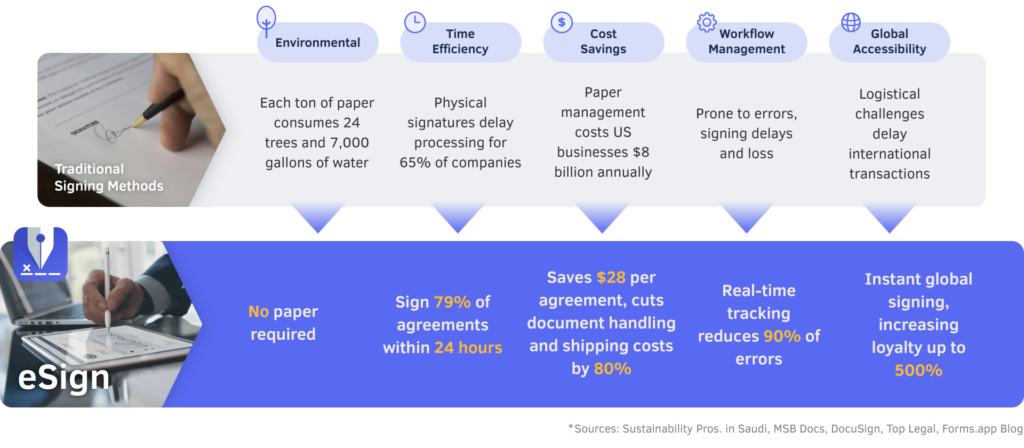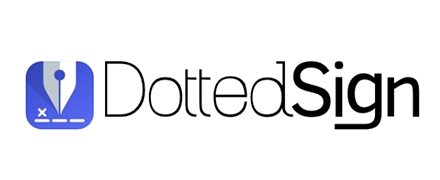Why eSignature Technology Should Be Part of Your ESG Strategy
Interest in Environmental, Social, and Governance (ESG) criteria by institutional investors has existed since at least 2006, but the term ‘ESG’ itself only became mainstream after the World Economic Forum (WEF) at Davos 2020. At that conference, the International Business Council (IBC) and the Big Four global accounting firms established a standardized framework for measuring twenty-two core financial and non-financial corporate ESG metrics. That framework was subsequently expanded to include thirty-four aspirational metrics that align with the United Nations Sustainable Development Goals (UN SDG), and focus on four key principles: government, planet, people, and prosperity.
Table of Contents
What is ESG?
Environmental, Social, and Governance (ESG) criteria are a set of standards that companies adhere to operate responsibly and sustainably. In simple terms, ESG refers to three key factors that investors and key stakeholders use to evaluate the ethical impact and sustainability practices of a company.
What are the Three Pillars of ESG?
Environmental
The “Environmental” aspect examines how a company manages its impact on the environment, including issues like carbon footprint, greenhouse gas emissions, and waste management.
Social
The “Social” criteria focus on how a company deals with relationships with employees, suppliers, customers, and communities, emphasizing social responsibility and ethical business practices.
Governance
Lastly, “Governance” looks at the company’s leadership, internal controls, and shareholder rights, ensuring transparency and fair practices. Together, these criteria help individuals and organizations make informeddecisions regarding investments and partnerships based on a company’s commitment to sustainable and socially responsible practices.

What is the Difference Between ESG and SRI (Socially Responsible Investing)?
ESG (Environmental, Social, and Governance) and SRI (Socially Responsible Investing) both aim to promote responsible investment portfolios, but they differ in approach and focus.
ESG is a framework used to evaluate the sustainability and ethical impact of an investment in three specific categories: environmental, social, and governance. It involves assessing a company’s policies and practices concerning environmental impact, social criteria, and governance to encourage responsible corporate behavior and inform decision-making.
On the other hand, SRI traditionally employs a restrictive approach, filtering out companies or industries that do not align with certain ethical or moral values. While ESG provides a systematic way to measure sustainability, SRI is more about aligning sustainable investing and sustainability initiatives with personal or institutional values and ethical considerations.
The Impact of ESG Criteria on Business Value
Focusing on the UN SDG and ESG criteria results in increased business value. A number of ratings exist for measuring the impact of prioritizing ESG criteria – among the most widely referenced of those are the ESG ratings from MSCI (formerly Morgan Stanley Capital International). An April 2024 report by MSCI found that the equities of Asia-Pacific (APAC) companies that prioritize governance, environmental sustainability, and social sustainability outperform the equities of companies that do not. The aggregate index of ESG-focused companies in the APAC region outperforms the same ESG-focused company indices in North America, Europe, and globally.
While the importance of the three ESG pillars (environmental sustainability, economic sustainability, governance) differed across markets, environmental sustainability played a key role in nine of the eleven APAC markets measured and was the most important ESG determinant of business performance in Taiwan, Korea, and Thailand. Improving environmental sustainability has been proven to increase business value, and the simplest way to do that is by transitioning away from a paper-based work environment via digital transformation.
Environmental Sustainability in Digital Transformation
Traditional paper-based workflows and processes are enormously costly and inefficient. Printed forms become outdated quickly and must be re-printed; paper records come with costs for offsite storage or increased rental expense for the floor space that filing cabinets require; additional staff is required for the maintenance and retrieval of records; and manual record storage creates business-impacting exposure in the event of flood or fire.

Paper-based business processes are also detrimental to the environment, causing many long-term environmental issues. According to the Environmental Paper Network, the global pulp and paper industry is one of the world’s biggest polluters and heaviest users of water resources (a single sheet of A4 paper requires up to 20 liters of water to produce). Paper production results in the loss of natural forests, requires 4% of global energy production, and often results in the toxic contamination of waterways. And despite recycling efforts, a large percentage of all paper is still incinerated or landfilled at end-of-use.
Adopting and implementing technology to transition services, operations, and processes from paper-based to a digital-based system is critical to promoting environmental sustainability. In addition to eliminating the issues with the printing, storage, maintenance, and retrieval of paper documents, digital transformation delivers efficiency gains in areas of workflow simplification, time to contract completion, reporting frameworks, and compliance. The cornerstone of digital transformation, especially for organizations with complex, high-volume agreements and compliance requirements, is eSignature technology.
Turn Sustainability Goals Into Action. Get 25% off DottedSign’s Business Plan Today!
The Efficiency and Sustainability of eSignature Technology
In addition to eliminating the need for the storage and retrieval of paper documents, eSignature technology also promotes environmental sustainability by reducing carbon emissions, minimizing potential travel by document signatories, and eliminating postage.
Governance is improved through enhanced security of documents, the ability to ensure the integrity of terms from senders to signers, the elimination of human errors, improved audit capabilities, and electronic archiving. As a core component of a digital transformation strategy, eSignature technology contributes to social sustainability by making businesses more attractive for remote workers and ESG-conscious younger employees.
It strengthens economic sustainability by streamlining operations across the entire business ecosystem. The efficiency provided by eSignature technology, in the form of faster time-to-completion for contracts, reduced expenses for printing and administration, and easier global collaboration, supports the long-term sustainable business practices of the businesses that adopt the technology.

The Benefits of DottedSign eSignature Solution
DottedSign is a cloud-based eSignature solution that supports both small to medium businesses and global enterprises. More than 4,200 enterprises worldwide, across industries ranging from healthcare, to manufacturing, to hospitality have become more environmentally sustainable by incorporating DottedSign as part of their digital transformation strategies and have experienced the following benefits:
Flexibility: DottedSign supports complex workflows requiring customization through API integration with leading business collaboration tools including Microsoft Teams, Salesforce, and Google Drive. This flexibility is ideal for large digitally transforming enterprises with high volumes of agreements that have regulated compliance requirements.
Superior Compliance: Integration of one-time-password (OTP) verification to confirm signatory identity and Adobe Approved Trust List (AATL) authorized certificate authorities for signature validation, audit purposes, and to ensure document tampering has not occurred.
Cost Effectiveness: DottedSign offers transparent pricing across all features and plans and is the most cost-effective eSignature solution for businesses large and small.
Ease of Use: User-friendly interface for internal teams, vendors, and customers and the ability to use DottedSign immediately upon implementation without the need for onboarding or formal training.
DottedSign eSignature solution can play a key role for businesses that are interested in improving efficiency, promoting ESG principles and working towards some of the United Nations Sustainable Development Goals (UN SDG). The elimination of most paper from the workplace promotes environmental sustainability, the enablement of remote work and a digital working environment improves social sustainability, and the security and compliance features embedded in DottedSign lead to better corporate governance.
Make the right digital investment decisions for your business strategies, whilst improving your organization’s environmental and economic sustainability. Get 25% off our DottedSign Business plan today, or try it out with a free 14-day Business Trial.



